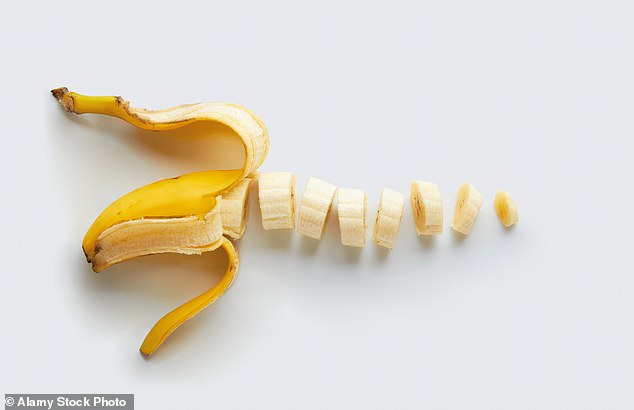It’s the leading cause of heart attack and stroke in the UK.
But high blood pressure, which impacts an astonishing 14 million British adults, often has no symptoms at all.
As a result, roughly half of people with the condition—also known as hypertension—don’t actually know they have it.
If left untreated, high blood pressure can be fatal—with recent research linking it to kidney failure and even vascular dementia.
It can be genetic, with people of African and Caribbean descent, as well as those with a family history of the condition, more likely to develop it.
But being overweight, smoking, not doing enough exercise and eating a diet high in salt can all also contribute.
Luckily, experts say, there are simple steps that people can take to reverse their high blood pressure.
So from ditching the takeaways, to meditation and bananas, here’s our expert-led guide to reducing your high blood pressure—without medication.

Having high blood pressure dramatically raises the risk of heart attacks, strokes, kidney failure and even dementia
Cut salt
The single biggest change you can make to lower your blood pressure, says cardiology consultant and professor of cardiology at Imperial College London Professor Rasha Al-Lamee, is cutting salt from your diet.
‘Reducing salt is what we tell everyone to do who comes into our clinic with high blood pressure,’ she explained.
Most adults in the UK eat around 8 to 9g of salt a day—but the recommended limit is no more than 6g, or around one teaspoon total.
Processed foods, such as bread, sauces, soups and ready meals are the main source of added salt in people’s diet, research has shown.
‘I usually tell people not to eat much processed and packaged stuff from supermarkets,’ said Prof Al-Lamee.
‘Ultra-processed foods have a lot of salt in them, as can snacks like crisps and condiments like ketchup.
‘People should be careful even when eating out—at restaurants or getting takeaway—as you don’t know how things are being made.
‘In general, it’s better to be cooking food yourself—that way, you know exactly how much salt you’re adding.’
Reducing your salt intake can lower your blood pressure within a few weeks, studies have shown.
Eat more potassium-rich foods
Too much sodium intake can raise blood pressure, by causing the body to retain excess water, which increases the blood’s volume and puts pressure on artery walls.
To mitigate this, try and eat more foods rich in potassium—a mineral which helps the body balance sodium.
Good sources of potassium include bananas, kiwis, potatoes, beans, lentils, leafy greens, yogurt, avocado and salmon.
Make sure to stay within the recommended limits of potassium intake however, warns Prof Al-Lamee.

Good sources of potassium include bananas, kiwis, potatoes, beans, lentils, leafy greens, yogurt, avocado and salmon.
Adults aged 19 to 64 need around 3,500mg of potassium a day—though the American Heart Foundation recommends up to 5,000mg a day for managing high blood pressure.
Exceeding this amount could put you at risk of high potassium, also known as hyperkalemia.
The condition, whereby the kidneys stop being able to remove extra potassium from the blood, can cause a heart attack and even death.
Maintain a healthy weight
After cutting salt intake, maintaining a healthy weight is also crucial to reducing blood pressure, says Professor Al-Lamee.
Research has shown that losing even five to 10 per cent of body weight can significantly reduce blood pressure.
Waist size is key: for men, their waist circumference should measure less than 94cm (37in), whilst for women, waist size shouldn’t exceed 80cm (31.5in).
‘Reducing your weight is one of the main things that we tell people in terms of blood pressure,’ says Prof Al-Lamee.

People with high blood pressure should aim to get their heart rate up for at least 20 minutes, three times a week, says Prof Al-Lamee.
‘This, along with exercise, is key to reducing strain on the heart and decreasing inflammation.’
Be physically active
People with high blood pressure should aim to get their heart rate up for at least 20 minutes, three times a week, says Prof Al-Lamee.
‘Lots of regular exercise is crucial for reducing blood pressure—especially strength training and aerobic exercise,’ she said.
‘Strength training in particular is very good for your bone density and bone strength, as well as vascular health.’
NHS guidelines advise patients with high blood pressure to aim for at least 150 minutes of moderate exercise a week.
This can include brisk walking, swimming, cycling and climbing stairs.
Even short bouts help: Taking three 10-minute brisk walks a day can lower your blood pressure by as much as 8 mmHg.
Limit alcohol
‘I always make sure to speak with my patients about alcohol consumption,’ says Professor Al-Lamee.
‘It’s so important to moderate your alcohol intake if you’re struggling high blood pressure.’
Alcohol can raise blood pressure—both in the short- and long-term—by stimulating the nervous system, which increases heart rate and narrows blood vessels.
In the longer term, regularly drinking more than the recommended limits for men and women can cause lasting high blood pressure by interfering with the brain’s ability to regulate blood pressure.
This sustained high pressure can strain the heart muscle and damage blood vessel walls, increasing the risk of heart attack and stroke.
As a result, experts suggest that drinking alcohol should be done in moderation to prevent high blood pressure.
One 2023 study, spanning several decades and including 20,000 people, suggests that blood pressure increases in line with alcohol consumption, starting from as little as one glass of wine per day.
To limit damage, make sure not to consume more than 14 units—not drinks—of alcohol a week, and try to spread this over several days, to give the body a chance to recover, guidelines recommend.
Your browser does not support iframes.
Eat a heart-healthy diet
Sticking to the Mediterranean diet is a great way to reduce blood pressure through diet, says Professor Al-Lamee.
The diet, which has been shown to reduce the risk of cardiovascular disease, type 2 diabetes, stroke and even some types of cancer, is rich in fruits, vegetables, wholegrains, beans, nuts and processed meat.
The health advantages attached to the diet are due to its emphasis on consuming fresh, unprocessed foods, healthy fats such as olive oil, and lean proteins like chicken.
Unsaturated fats, from olive oil, nuts and fish, as well as low intake of saturated and trans fats, help to lower cholesterol.
High fibre content from fruits, vegetables and legumes, meanwhile, can maintain healthy blood sugar and pressure levels.
If the Mediterranean diet itself doesn’t appeal, try to stick to moderate dairy and minimal red or processed meat when eating, says Prof Al-Lamee.
And, try swapping butter for olive or rapeseed oil—this swap alone can reduce systolic BP by 8 to 14 mmHg over time.
Manage stress and sleep
‘In general for patients with high blood pressure,’ says Prof Al-Lamee, ‘It’s also very important to manage stress and sleep.’
Stress hormones in the body can actually temporarily raise blood pressure by initiating the fight or flight response, while insufficient sleep or poor-quality sleep can lead to chronically higher blood pressure.
To mitigate this, try relaxation breathing, mindfulness, yoga, or time outdoors, recommend experts.
Poor sleep—defined as less than six hours a night—also increases blood pressure risk. Instead, aim for seven to eight hours of sleep a night, says Prof Al-Lamee— especially if your blood pressure is already high.
Quit smoking
Smoking can temporarily raises one’s blood pressure, and stiffens arteries over time.
Quitting smoking, meanwhile, has been shown to improve cardiovascular risk almost immediately.
‘Stopping smoking is more important from a wider health perspective than just blood pressure,’ said Prof Al-Lamee.
‘It can increase cardiovascular risk by damaging the inner lining of blood vessels, causing them to thicken and harden.’
If you already have high blood pressure, smoking significantly accelerates the process of arterial narrowing, dramatically raising your risk of a heart attack or stroke.
In fact, research suggests smoking is responsible for almost a third of all heart disease deaths, a major risk factor of sustained high blood pressure.
Your browser does not support iframes.
Get regular blood pressure checks
Many people don’t feel symptoms even when their blood pressure is high.
To ensure you know your risk, ask your GP for a blood pressure test.
Home monitors are also an accurate and affordable choice — aim for a blood pressure of below 135/85 mmHg at home readings.
Be realistic about medication
If your blood pressure remains high despite lifestyle changes, medication may still be needed to protect your heart, brain and kidneys — but the steps above can reduce the dose or number of drugs required.
‘It really depends how high your blood pressure is, in terms of whether you’ll need medication,’ says Prof Al-Lamee.
‘If it’s only borderline high, then lifestyle changes is where you should start.
‘If this still doesn’t lower blood pressure enough, then it may be necessary to start on medication as well as making those adjustments.
‘But I’ve seen people who, after losing weight or changing their diet, need a lower dosage of medication than they did before.’
GPs can advise on whether or not you need to take medication for your blood pressure.
